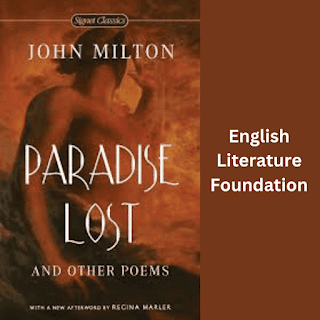Paradise Lost Book 1 by John Milton: A Detailed Summary
Paradise Lost Book 1 by John Milton is a literary
masterpiece and one of the greatest works of English literature. The poem is
divided into 12 books and explores the story of Adam and Eve, their temptation,
and their fall from grace. In this article, we will provide a detailed summary
of Book 1 with headings.
Introduction
The poem opens with an invocation to the Muse to inspire the
poet to write the story of man's first disobedience and the loss of Paradise.
The poet asks the Muse to tell him about Satan's rebellion, his fall from
heaven, and his subsequent journey to Earth.
Satan's Rebellion
In this section, the poet describes the rebellion of Satan
and his fellow fallen angels against God. Satan, who was once an angel of
light, is now a fallen angel, cast out of heaven along with his companions.
Satan is filled with hatred for God and seeks revenge. He convinces his
followers that they can never win against God, but they can still oppose him by
corrupting his new creation, man.
Satan's pride is a major contributing factor to his
rebellion. He believes that he should be equal to God and that he should
receive the same adoration and respect. However, God reminds him that he is not
equal to him and that he must serve God in humility.
Satan's Journey to Earth
In this section, Satan and his companions make their way to
Earth. They land on a mountain, and Satan decides to explore the new world. As
he travels, he comes across a beautiful garden and decides to enter it. It is
the Garden of Eden, where Adam and Eve live.
Satan's decision to enter the Garden of Eden is not
accidental. He is looking for a way to tempt Adam and Eve into disobeying God.
He believes that by doing so, he can corrupt God's new creation and prove that
he is more powerful than God.
The Garden of Eden
In this section, the poet describes the beauty of the Garden
of Eden. It is a paradise, full of lush vegetation, clear rivers, and a variety
of animals. Adam and Eve live here, innocent and unaware of the danger that
awaits them.
The Garden of Eden is an idyllic place, where everything is
perfect. Adam and Eve live in harmony with nature and with each other. They are
innocent and pure, uncorrupted by sin. However, their innocence will not last
forever.
Satan Tempts Eve
In this section, Satan takes the form of a serpent and
approaches Eve. He tries to tempt her into eating the forbidden fruit from the
Tree of Knowledge. Eve is initially hesitant, but Satan convinces her that God
has forbidden her from eating the fruit because he does not want her to become
like him.
Satan is a master of deception, and he uses his powers to
try to corrupt Eve. He appeals to her pride and her desire for knowledge,
telling her that by eating the fruit, she will become like God. Eve is
initially hesitant, but Satan's words are convincing, and she gives in to
temptation.
Eve's Temptation
In this section, Eve succumbs to Satan's temptation and eats
the forbidden fruit. She then gives some to Adam, who also eats it. This act of
disobedience causes them to lose their innocence and brings about their fall
from grace.
Adam and Eve's decision to eat the fruit is a pivotal moment
in the poem. It represents the first act of disobedience against God and the
beginning
God's Punishment
In this section, the poet describes God's reaction to Adam
and Eve's disobedience. He sends his angels to expel them from the Garden of
Eden and pronounces a curse upon them. Adam and Eve are punished for their
disobedience, and their lives will never be the same.
Adam and Eve's expulsion from the Garden of Eden represents
the loss of paradise. They are now forced to live in a world where there is
pain, suffering, and death. The curse that God pronounces upon them is a
reminder of the consequences of disobedience.
Conclusion
In conclusion, Paradise Lost Book 1 by John Milton is a
masterpiece of English literature that explores the story of Adam and Eve's
temptation and fall from grace. The poem is rich in themes, including pride,
disobedience, temptation, and the consequences of sin. Through his masterful
use of language and poetry, Milton brings the story to life and invites the
reader to reflect on the nature of man and his relationship with God.
FAQs
- What
is the meaning of the title Paradise Lost?
The title Paradise Lost refers to the loss of paradise that
occurs as a result of Adam and Eve's disobedience.
- What
is the significance of Satan's rebellion?
Satan's rebellion represents the first act of disobedience
against God and is the beginning of the fall from grace.
- Why
does Satan tempt Eve?
Satan tempts Eve because he wants to corrupt God's new
creation and prove that he is more powerful than God.
- What
is the significance of Adam and Eve's expulsion from the Garden of Eden?
Adam and Eve's expulsion from the Garden of Eden represents
the loss of paradise and the consequences of disobedience.
- What
are the major themes of Paradise Lost?
The major themes of Paradise Lost include pride,
disobedience, temptation, and the consequences of sin.

